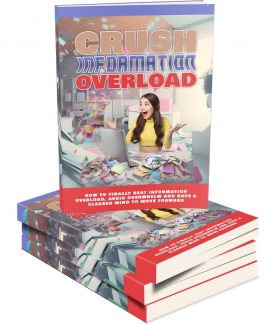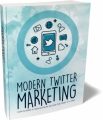 License Type: Master Resell Rights
License Type: Master Resell Rights  File Type: ZIP
File Type: ZIP
 SKU: 65195
SKU: 65195  Shipping: Online Download
Shipping: Online Download
Sample Content Preview
Introduction
As a society, we have instant access to more information than ever before. With the arrival of the computer, the invention of the Internet, and the popularity of social media, we have entered into a world of 24/7 information. We have so much information coming into our brains that we don't stop and take the time needed to decipher, interpret, and apply meaning to the knowledge we've gained. We've become absorbed in the overpowering need to know everything about anything and everyone.
The world is changing at an exceedingly rapid pace. Life seems to have become much more demanding and stressful over the last several decades. We've officially entered the Age of Information that is being ruled by computers, smartphones, and a constant stream of information that we have a need to know relationship
with. We have a hard time separating ourselves from our phones for even five minutes. Technology has taken over our lives and overloaded our minds.
All the information that we obtain while surfing the web and browsing our social media sites has created a technology addiction in much of the population. We've forgotten what silence feels like and are overloaded with information that is available to us 24 hours a day, seven days a week. This has led to the overshadowing of our ability to communicate face-to-face and has clouded our mind with digital information that has affected how we process and retain information. This addiction to technology has also resulted in more people trying to multitask, which results in decreased productivity and focus, and an increase in erroneous errors.
To bring ourselves back to the present and beat the information overload that we've become subject to, we have to be willing to disconnect from technology and reconnect with each other. This book will guide you through the process of beating information overload to have a clearer, more focused mind that will allow you to move forward.
Chapter 1 – What is Information Overload
Information overload is described as, an overwhelming feeling upon the receipt or collection of an indigestible or incomprehensible amount of information, the sense of being faced with an amount of data that one has no hope of completely processing, or when a person feels unable to read all the information that is presented or available to them, mainly where they need to make a decision based on that information but can't because there is just too much to take in, in the time available.
Today, thanks to the Internet and social media, we are always besieged by information regardless of whether we asked for it or not. This can best be seen in the obscene amount of junk emails that clog our inboxes daily. It can also be seen in the increasing number of sources where you can obtain information. People often interchange the word data and information. However, the two are distinctly different. Data refers to the elements or pieces of information that individually have little or no value, while information is the organization and interpretation of that data into a format that provides new insight. Information, unlike data, is directly associated with learning.
When you learn a new subject, you are implementing three simultaneous processes. First, you acquire the new information that may run counter to or replace information that you already know. Second, is the process of transformation where the knowledge gained is manipulated to make it fit new tasks. The final learning process is the evaluation of the information to ensure that it is adequate to the task. Therefore, information can be described as the acquisition of new knowledge from various sources and data elements, that when internalized can affect a difference in an individual's previous thoughts, education, or actions. Keeping this in mind, information overload can be simply put as too much information that one can comprehend at any given time causing feelings of stress, helplessness, and anxiety.
The Start of Information Overload
You may not know this, but information overload predates the advent of the Internet and popularity of social media sites. In fact, it has a long history that dates back to 1453, when Gutenberg invented the printing press. The printing press allowed the development of new communication patterns, with information being printed and distributed by the millions instead of being copied by hand. People went from reading just a few hundred words a day to being able to read pages and pages of information. This resulted in a massive transformation in society.
We can only assume that people were excited by the invention of the printing press. As a result of Gutenberg’s invention, books
became less expensive to produce, meaning they could be distributed to the masses. Books were no longer just for the select few and scholars. Symbolism and group presentation systems soon followed as a way to communicate messages. This included periodicals, associations, and new political parties. Shortly after, libraries began sprouting up everywhere as a way to organize all the new books of information.
It didn't take long for printing presses to start printing anything that came their way to make more money, with little attention being paid to the quality of information being printed. This resulted in scholars becoming overwhelmed with the access to this knowledge, giving birth to information overload.
In recent decades, advances in information technology have evolved from using carbon paper ditto machines to photocopying. This has made replicating information more accessible and led to information being digitized and copied in limitless numbers. The digitized information has allowed for the publishing of information that was previously restricted to the printing press. The introduction of the word processor has eliminated the need for a secretary equipped with a steno pad with access to a typewriter and white-out.








